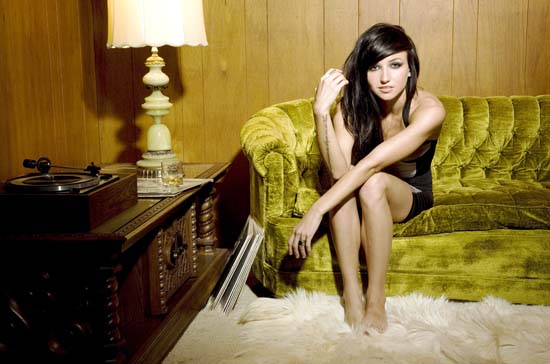When it comes to 1980s pop nostalgia, is there a more satisfying recipe than breathy Cyndi Lauper-style vocals accompanying melodic anthems saturated with bouncy synthesizers and bubbly keyboard textures? LIGHTS, a Canadian electro-pop singer-songwriter, will employ these very ingredients at the Troubadour to a sold-out crowd on Tuesday night in support of her recently released debut album, “The Listening.”
Garnering attention through her contagious and accessible songs, LIGHTS received the award for best new artist at Canada’s Juno Awards earlier this year. The album is loaded with songs like lead single “Saviour,” a mid-tempo pop gem that ambles into approachable sing-along territory with an infectious and confessional chorus, carefully straddling the line between spacey dance-pop and a New Wave disco-revival.
“She’s come a long way in the last few years,” LIGHTS’ manager, Jian Ghomeshi, said. “She’s built this family around herself, with a full touring band and the record label behind her, but at the core of what she’s doing, she’s still the same girl I met eight years ago that writes all her songs in her bedroom.”
For LIGHTS, making music has been a natural fit from a very young age. After being born in Timmins, Ontario, LIGHTS was constantly on the move with her missionary parents. They moved frequently, and though she lived in places as diverse as the Philippines and Jamaica, music was always a constant in her life.
“From a young age, I can remember my dad would always play the guitar and sing songs for me when I would go to sleep,” LIGHTS said. “When I got my first guitar at 11, I learned how to play a few chords and immediately began to write my first song.”
Her desire to create music didn’t stop there as she quickly bought an 8-track tape recorder to record songs with.
“The guitar was a great instrument for learning how to write songs and figuring out how to play music,” LIGHTS said.
However, she quickly found the instrument limited her artistic expression.
“I had all of these different sounds in my head that I wanted to use, so that’s why I started learning how to play the keyboards, playing around with textures and sounds in a way that the guitar couldn’t do,” LIGHTS said.
LIGHTS focused intently on learning how to write songs on her guitar and then fleshing out the extra sounds using the keyboards.
“I want my songs to sound like they were pulled from outer-space, like intergalactic electro-pop,” LIGHTS said. “But I focus intently on the songwriting; I think the best songs are the ones where you can strip away the smoke and mirrors and just play them on the guitar or piano and they’ll still sound good.”
LIGHTS tries to let her music emulate her own life, admitting to her not-so-secret love for comic books, science fiction and video gaming. She’s even gone as far as to let her artistic expression shine through in her own name: she recently had it changed from her birth name, Valerie, to LIGHTS, a nickname that has stuck since her childhood. “It’s just another expression of who I am as a person, like a tattoo,” LIGHTS said.
With this, LIGHTS has brought her music closer to the center of her life, taking her stage name and making it her real name.
Despite the mostly digital nature of the music on “The Listening,” LIGHTS has found a way to bring performance energy to her live shows, employing the help of two other musicians on tour. This has allowed her the opportunity to harness the power of a live drummer and the added keyboardist to interact with.
Headlining her first tour in America, LIGHTS has played many shows to sold-out venues, allowing her the best opportunity to create a deep sense of community through her performances.
“Each night, I’m looking for those moments where everybody in the venue forgets they are individuals and just feel a sense of intense togetherness,” LIGHTS said, reflecting her desire to create a sense of unity between herself and her audience.
Elizabeth Upton, professor of musicology, counts herself as a fan.
“By playing electronic music, she’s given the opportunity to do many other things within her songs. The power of music like this lies not only in its ability to trigger emotions in a listener but to trigger similar emotions in a large group of listeners,” Upton said.
“She’s deliberately choosing sounds that give them an easy reference point for connecting with it, drawing on a variety of influences.”
Listeners will connect with more than just the sounds, as LIGHTS’ music is designed to move both your body and your heart.
“Her lyrics are often confessional and reference the past, and this signals an intent to simulate the feeling that there was something in the past that has been lost in the present,” Upton said. “And that’s the very definition of nostalgia, that sense of longing to return to a place you’ve never been.”
